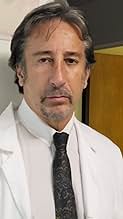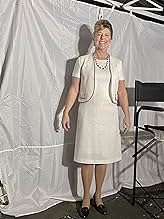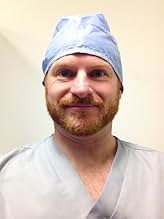Füge eine Handlung in deiner Sprache hinzu1969. Dr. Audrey Evans joins world-renowned children's hospital and battles sexism, medical conventions, and the subterfuge of her peers to develop revolutionary treatments and purchase the ... Alles lesen1969. Dr. Audrey Evans joins world-renowned children's hospital and battles sexism, medical conventions, and the subterfuge of her peers to develop revolutionary treatments and purchase the first Ronald McDonald House, impacting millions.1969. Dr. Audrey Evans joins world-renowned children's hospital and battles sexism, medical conventions, and the subterfuge of her peers to develop revolutionary treatments and purchase the first Ronald McDonald House, impacting millions.
- Regie
- Drehbuch
- Hauptbesetzung
- Auszeichnungen
- 4 Gewinne & 6 Nominierungen insgesamt
Empfohlene Bewertungen
I felt that the film was very well balanced. It showed the complexity's of being a woman in a male dominated environment. Her compassion for the children and their parents was self evident. I also liked how easily she could subvert or coerce people to her side. The opening scene of the movie tell you everything you really need to know about her personality. Her tenacity is a blessing and a curse. At times, she doesn't know when to take her foot off the gas pedal and apply the brakes. My only complaint is that I would love to have seen a little bit more of her personal life during this Period. As a Philadelphian I'm a Lil was ashamed that I didn't know anythingabout her.
Absolute incredible production. This story is so heartwarming!! Finally a movie hits theaters that makes you feel, inspires you, makes you want to do good for the world and never give up. The cast absolutely crushed, Natalie was fantastic. Audrey is a hero and the perfect sort of leader. She is funny, kind, smart, brave, strategic and caring. A female that I will always look up to and admire to be like. This film is a must see. This should make waves through the medical industry and re-inspire and reinvigorate doctors around the world. I hope this movie makes an International push as everyone in the world should be privy to this inspiring story. Well done to everyone that touched this project.
Cinematically honoring an individual for determined, heroic accomplishments is certainly an inspiring and noble reason for making a movie. But, to do justice to the story, the elements need to be engaging, entertaining and compellingly told, which is where this fact-based offering from director Ami Canaan Mann comes up short. The film presents the little-known, fact-based story of Dr. Audrey Evans (Natalie Dormer), a transplanted English pediatric oncologist who took over this practice area at the prestigious Children's Hospital of Philadelphia (CHOP) in 1969. At the time, she proposed the implementation of new treatment strategies for youngsters afflicted by childhood cancer, a radical departure from the standard care in use at the time, which was quite ineffectual as evidenced by its 10% survival rate. She also spearheaded efforts to caring for the considerable financial and daily living needs of the families of these young patients, many of whom were saddled with significant logistical burdens on top of attending to the welfare of their children. Evans often faced an uphill battle from skeptics and naysayers in her quest to put these initiatives into practice, given the departures they represented from established procedures. However, her relentlessly aggressive and persuasive capacity for getting the attention of benefactors and peers, like Drs. Dan D'Angio (Jimmi Simpson), C. Everett Koop (Clancy Brown) and Brian Faust (Brandon Michael Hall), as well as her boundlessly kind compassion for those under her care, ultimately transformed the hospital's cancer treatment program, a model since adopted elsewhere that has raised the successful cure rate to approximately 80%. In addition, her efforts to address the needs of patient families led to the establishment of the first Ronald McDonald House, a program that has subsequently spread globally. To be sure, these are indeed praiseworthy achievements. However, the picture's account of Audrey's efforts is somewhat pedestrian, shallow and meandering, following a rote narrative formula that's predictably on cue and comes across like a virtual replay of events previously depicted much more effectively in director Penny Marshall's endearing, often-underrated release "Awakenings" (1990). There's also precious little attention paid to capturing the mood of the era in this period piece biography, a quality that feels noticeably underdeveloped. To its credit, the film features a fine performance from Dormer and the ensemble of supporting players, but this is far from enough to save the picture from its innate mediocrity and keeping it from being a fitting tribute to the remarkably dedicated work of its protagonist. Dr. Evans courageously demonstrated that her children deserved better than what they were getting, but, unfortunately, the same can't be said here in the telling of Audrey's truly laudable story.
The subject of this film, Dr. Audrey Evans, a pediatric oncologist at the Children's Hospital of Philadelphia (CHOP), is nothing short of inspirational. It's quite realistic to think of her as Mother Teresa with an MD. Like Mother Teresa, Evans was devoutly religious and believed deeply that she was put on earth to care for children.
The story begins in 1969, when Dr. Evans has been recruited to CHOP after spending a few years at the University of Chicago. Overcoming innumerable obstacles, she and a couple of colleagues eventually developed a staging system for neuroblastoma, the most common pediatric cancer. As a result of Dr. Evans' work, treating children with neuroblastoma for the first time could be customized based on the patient's disease stage. Dr. Evans sense of humanity and her complete devotion to her patients make the title of the film entirely accurate.
"Audrey's Children" grew out of an interview in 2017 conducted by Julia Fisher Farbman (who wrote the script here) and Dr. Evans for the Amazon series "Modern Hero." Farbman was so impressed by her subject that she produced this film, raising all the funds from private sources. Because of the shoestring budget, the film had a shooting schedule of 23 days.
A key strength here is the film's accuracy and intense attention to detail. After the "Modern Hero" interview, Farbman spent many hours with Dr. Evans, who passed away in 2022 at age 97. The story is historically accurate and meticulously told. The Oncology Department at CHOP has publicly endorsed the medical accuracy of the story.
When filming, Director Ami Canaan Mann was equally attentive to detail. To ensure that the story was visually grounded in the time period, she used 35mm Ektachrome film. (HBO's "Euphoria" and the film "Poor Things" used the same cinematic technique.) As a result, the colors here are highly saturated and very high-contrast by today's standards. The production design (Amber Unkle), set design (Kimitha Cashin) and costumes (Sarah Maiorino) are equally faithful to the period (1969-1974).
What keeps the film from soaring is the script. There's no dramatic tension anywhere to be found. While there are occasional references to the misogyny Dr. Evans endured, there's nothing here that really gives the story any momentum. The film labors under the additional burden of its overarching theme: childhood cancer. Capturing vignettes of families who know their children are going to die (the mortality rate for childhood cancer in 1969 was 90%) involves some very heavy lifting. Efforts to generate a propulsive narrative are further weighed down by a script that necessarily involves a lot of medical terminology. When the central scenes involve debating which clinical features define the four stages of neuroblastoma, the creative team and the audience clearly have their work cut out for them. Before seeing this film, purchasing a copy of the latest edition of "Taber's Cyclopedic Medical Dictionary" might prove to be a good investment.
I wish I could be more supportive of this admirable attempt to lionize a modern-day saint. I also wish the creative team had channeled their energies, their work ethic and their good will into a first-rate documentary. As a drama, this film doesn't do her justice.
The story begins in 1969, when Dr. Evans has been recruited to CHOP after spending a few years at the University of Chicago. Overcoming innumerable obstacles, she and a couple of colleagues eventually developed a staging system for neuroblastoma, the most common pediatric cancer. As a result of Dr. Evans' work, treating children with neuroblastoma for the first time could be customized based on the patient's disease stage. Dr. Evans sense of humanity and her complete devotion to her patients make the title of the film entirely accurate.
"Audrey's Children" grew out of an interview in 2017 conducted by Julia Fisher Farbman (who wrote the script here) and Dr. Evans for the Amazon series "Modern Hero." Farbman was so impressed by her subject that she produced this film, raising all the funds from private sources. Because of the shoestring budget, the film had a shooting schedule of 23 days.
A key strength here is the film's accuracy and intense attention to detail. After the "Modern Hero" interview, Farbman spent many hours with Dr. Evans, who passed away in 2022 at age 97. The story is historically accurate and meticulously told. The Oncology Department at CHOP has publicly endorsed the medical accuracy of the story.
When filming, Director Ami Canaan Mann was equally attentive to detail. To ensure that the story was visually grounded in the time period, she used 35mm Ektachrome film. (HBO's "Euphoria" and the film "Poor Things" used the same cinematic technique.) As a result, the colors here are highly saturated and very high-contrast by today's standards. The production design (Amber Unkle), set design (Kimitha Cashin) and costumes (Sarah Maiorino) are equally faithful to the period (1969-1974).
What keeps the film from soaring is the script. There's no dramatic tension anywhere to be found. While there are occasional references to the misogyny Dr. Evans endured, there's nothing here that really gives the story any momentum. The film labors under the additional burden of its overarching theme: childhood cancer. Capturing vignettes of families who know their children are going to die (the mortality rate for childhood cancer in 1969 was 90%) involves some very heavy lifting. Efforts to generate a propulsive narrative are further weighed down by a script that necessarily involves a lot of medical terminology. When the central scenes involve debating which clinical features define the four stages of neuroblastoma, the creative team and the audience clearly have their work cut out for them. Before seeing this film, purchasing a copy of the latest edition of "Taber's Cyclopedic Medical Dictionary" might prove to be a good investment.
I wish I could be more supportive of this admirable attempt to lionize a modern-day saint. I also wish the creative team had channeled their energies, their work ethic and their good will into a first-rate documentary. As a drama, this film doesn't do her justice.
This was such an incredible movie. Dr. Evans overcame so much in her career to improve the lives of her children. Such a well done film, excellent movie from start to finish! Especially with the climate of political funding, this movie highlights the importance of critical medical research and the need for continued efforts to save the lives of children all over the world. Thank you, Dr. Evans for not giving up and for sharing your incredible mind. You truly were the greatest human and doctor! Thank you for working so hard to improve neuroblastoma treatment and outcomes. And lastly, thank you Julia Fisher Farbman for such a beautiful film!
Wusstest du schon
- WissenswertesFilmed in 23 days.
- PatzerSeveral scenes take place on the roof of the hospital with Philadelphia City Hall nearly next door. The Children's Hospital of Philadelphia from 1916 to 1974 was at 18th & Bambridge which is many blocks away with City Hall not even being visible from the hospital roof.
Top-Auswahl
Melde dich zum Bewerten an und greife auf die Watchlist für personalisierte Empfehlungen zu.
- How long is Audrey's Children?Powered by Alexa
Details
- Erscheinungsdatum
- Herkunftsland
- Offizieller Standort
- Sprache
- Auch bekannt als
- Дети Одри
- Produktionsfirmen
- Weitere beteiligte Unternehmen bei IMDbPro anzeigen
- Laufzeit
- 1 Std. 50 Min.(110 min)
- Farbe
Zu dieser Seite beitragen
Bearbeitung vorschlagen oder fehlenden Inhalt hinzufügen










































